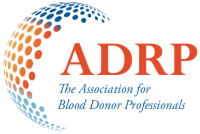Improving donor retention following a temporary deferral: A cluster randomized controlled trial of deferral educational materials
Full article available for purchase in link provided
Authors
Carley N Gemelli, Sarah P Kruse, Amanda Thijsen, Nina Van Dyke, Surendra Karki, Tanya E Davison
Abstract
Background
Providing educational materials to deferred donors has been shown to increase their understanding about their deferral and knowledge about their return. The aim of this study was to determine the effectiveness of educational materials in increasing the retention of deferred donors.
Study Design and Methods
A three-arm cluster randomized controlled trial was conducted, with the following conditions: (a) Incenter Brochure plus Email; (b) Email Only; (c) Control. The Incenter Brochure plus Email condition also included a guided conversation led by staff at the point of deferral. Donors were followed up for 3 months after their deferral had ended to determine if they had attempted to donate.
Results
Compared with the Control condition, donors in the Incenter Brochure plus Email condition had increased odds of return at 3 months after their deferral ended (OR: 1.16; 95% CI 1.00–1.33). Subgroup analysis highlighted that novice (OR: 1.38; 95% CI 1.04–1.83) and established donors (OR: 1.36; 95% CI 1.13–1.64) had increased odds of return if they received the incenter materials. Donors who were deferred to maintain their well-being (OR: 1.28; 95% CI 1.03–1.60) and donors with a prior deferral history (OR: 1.55; 95% CI 1.15–1.55) had increased odds of return if they received the incenter materials. No significant differences were found between the Email Only and Control conditions.
Discussion
This trial demonstrates the benefits of providing onsite educational materials to donors at the point of deferral. This is a simple, effective strategy to increase the return behavior of donors within 3 months of their deferral ending.
May 22, 2022
Related Resources
Engaging blood donors as advocates Social media preferences and associations with marketing
Background: Various critical medical procedures would become impossible without blood donations—saving lives in emergencies, surgeries, and chronic conditions like thalassemia. Therefore, it seems crucial to enhance donor recruitment and ensure…
Rethinking the role of older donors in a sustainable blood supply
INTRODUCTION Many countries, particularly high human development index countries, are facing the challenge of an aging population.1 For Blood Collection Agencies (BCAs) in these countries, an aging population poses two…


